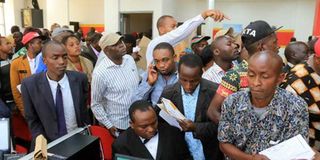Things have changed: When losing is as good as winning

Jubilee aspirants submit their nomination papers at the party’s headquarters in Pangani, Nairobi, on March 29, 2017. PHOTO | JEFF ANGOTE | NATION MEDIA GROUP
What you need to know:
- Even in the countries where the opposition has little prospect of winning, the nominations are still furiously fought.
- In Africa, the one group that will always get paid is ministers, MPs, senators, and councillors.
- While many opportunists have rushed into politics, it is also true that quite a few good men and women have also joined the fray.
Even those who have been urging citizens to get involved in politics seem bewildered by the sheer number of Kenyans who have thrown their hats in the ring for the August elections.
It seems from Independent Electoral and Boundaries Commission data that the most sought-after position is the once thought-to-be-lowly job of member of the county assembly.
The big rush to stand has, in turn, caused a nightmare for the political parties.
They are finding it almost impossible to handle party nominations, which have been disrupted by violence and the most scandalous monkey tricks.
However, there is really nothing uniquely Kenyan about this. This do-or-die approach to party nominations, and the flood into politics has happened in most of Africa over, especially, the last 10 years.
FURIOUSLY FOUGHT
In South Africa, Nigeria, Zambia, and Zimbabwe party nominations have been cut-throat, in both the ruling and opposition parties. In East Africa, the nominations in Tanzania and Uganda in 2015 were even more acrimonious than the previous ones.
So, we see that even in the countries where, for various reasons, the opposition has little prospect of winning, the nominations are still furiously fought.
Decentralisation and devolution in countries such as Kenya, South Africa, and Nigeria, have opened up possibilities for opposition parties to win power in regions where they are strong, even though they ultimately lose the war for power at the centre, so there is an added incentive there for them to contest.
But if we try to look for commonalities, economics might explain it. In these very uncertain economic times, the only job left that, if you get it, you can be 99 per cent sure you will keep for five years, is an elective position.
POOR PERFORMANCE
Unlike the highly paid chief executive of a listed company, no scandal, not even a rape charge, no poor performance, will unseat you. That level of job security is priceless today.
Then, you are sure you will get paid. The central and regional governments are terrible at paying everyone else.
In Kenya, for example, one economist told me that defaulting county governments have led to the “biggest wipeout of small and medium size businesses upcountry in the country’s history”.
But everywhere in Africa, the one group that will always get paid is ministers, MPs, senators, and councillors. At least they are paid first, before cheques are cut for the rest of us.
This is possible, in turn, because the most enduring improvement of the post-Cold War era in Africa has been tax reform.
POLITICAL PATRONAGE
The creation of new quasi-autonomous and reasonably professional tax authorities has made possible the efficient mobilisation of resources for political patronage.
There has been some benefit too. While many opportunists have rushed into politics, it is also true that quite a few good men and women have also joined the fray.
While we might not yet have had an improvement in political morality, there is no denying that the technical quality of politicians in most of the continent has gone up.
The one group of people looking at all this intense competition with glee is business lobbyists.
With a crowded field, the costs of winning – and retaining – a political seat has gone up, a lobbyist told me.
RECOVER COSTS
This means, he said, those who win today, are more likely than in the past, to rush to recover their costs.
The result is that it is actually easier and cheaper today to bribe an MP or councillor on a committee to get a vote or decision that is favourable for your company or industry.
That is certainly not good for voters, but the very tough economic conditions that have forced many to seek security in elective politics, have also reduced the cost of buying favourable policies for businesses (except tobacco).
The other thing we also need to look at in Africa is the “losers’ market”. We tend to focus too much on winners, and in the process forget that a winning president best broadens his base not by pampering the victors, but by appeasing the losers.
Therefore, in a presidential system you have a greater chance of becoming an ambassador, permanent secretary, director of a state parastatal, and even minister, if you lose an election than if you win it.
Because losing is also winning, especially if you are a member of the ruling party, those who are nominated go into elections with virtually zero risk. What gig is better than that?
The author is publisher of Africa data visualiser Africapedia.com and explainer site Roguechiefs.com. Twitter@cobbo3





